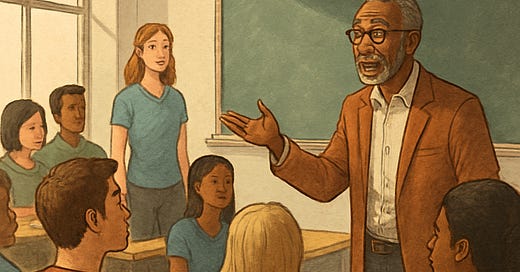The Best Advice I've Ever Received
What one uncomfortable moment in a classroom taught me about every room I've entered since
I entered my first full-time class for Temple University’s Sports Administration Graduate Program full of fear and trepidation. I had to travel to campus in one of the less safe areas of the city at night, find parking, and walk into a classroom full of people I didn’t know.
This was not my first choice for post-graduate education. My original intention was to pursue a doctoral degree in history and teach at the university level. I was rejected from a few schools and accepted into a few others, but it didn’t feel right.
For a year after graduating from college, I was floating adrift as I figured out what direction to take my life. I worked as a substitute teacher, coaching with two different swim programs, and was the store manager for a local screen printing and embroidery business.
I didn’t know what I wanted to do, but I knew this wasn’t it.
Eventually, I settled on a career in sports, although my heart wasn’t 100% into it in the beginning.
I applied to Temple late, after the regular deadline, but found a backdoor into the program by taking two summer classes as a visiting student. This put me at the front of the line if any previously admitted students declined the invitation. In late June, I was admitted into the Sports Administration program.
The flagship class of the program, at that time, was SPAR 501: Administration of Sports and Recreation. The professor for this class, Dr. Michael Jackson, was one of the program founders and enjoyed a long career in athletic administration at numerous universities nationwide. I don’t think I am exaggerating when I say that, at that time, Dr. Jackson was the heart of the Temple Sport Administration program.
For some reason, this intimidated me.
I walked into class that September evening, one of the final students to arrive before the scheduled start of class, and my suspicions were confirmed: I knew NO ONE in that room. I took an available seat at the back of the room and sat quietly, waiting for Dr. Jackson to arrive and for the class to start at 7:00 pm.
7:00 pm arrived, and Dr. Jackson had not—no problem, first day and a few minutes behind.
7:05 pm…still not there.
7:08 pm…still not there and I am UNCOMFORTABLE. Others in the room seemed to know each other. Maybe they had other classes together before this one. Some are chatting; I want to throw the invisibility cloak over myself until class starts.
7:09 pm, and in walks Dr. Jackson. He moves to the front of the classroom without acknowledging anyone or the fact that he was late. He stands there for a few seconds, surveying the students in his class.
Then he points to a woman in the third row:
“Please stand up.”
She does…slowly.
“Tell us the names of three people sitting around you, where they are from, and what they do.”
She smiled and bashfully tucked her chin, “Um…I can’t.”
“Thank you,” said Dr. Jackson, “please sit down.”
He pointed to a man sitting close to the door, “Please stand up, tell us three names of people sitting around you, where they are from, and what they do.”
He was also unable to complete the task.
Great, I thought. He’s going to call on me next, and I will look like a fool because I haven’t talked to anyone. (As I type this, I see how ridiculous this thought process is since no one could complete the task.)
Dr. Jackson did this exercise with one other person resulting in the same results as the first two students.
When that person sat down, Dr. Jackson took a deep breath, cracked a partial smile, and said, “Ladies and gentlemen, no matter where you are or what you are doing, you have to get to know the people around you. I don’t care if you are in this classroom, at a football game, or on the subway. Get to know the people around you in any situation, because you never know if that person could someday become the most important person in your life.”
He then instructed the class to walk together to the student bookstore and all purchase the class textbook. When we returned, he told us he would repeat the exercise and expected better results.
At the time, I thought Dr. Jackson was talking about networking. And in a way, he was. I figured he wanted us to learn people’s names because that’s what professionals do. You shake hands, swap business cards, and remember faces in case they matter later. That’s what I assumed he meant when he said, “Get to know the people around you.”
But now, having put this into practice for 20+ years, and through many highs and lows in life, I see it differently. What he gave us wasn’t networking advice. It was something more human.
What Dr. Jackson was really saying was this: Wherever you are, take the risk to connect.
You never know what role someone might play in your life, not just in your career, but in the moments that matter. Maybe they open a door. Maybe they become a sounding board, a close friend, someone who really hears you when you’re struggling.
What I couldn’t grasp back then, nervous, quiet, sitting in the back, was that connection isn’t about what you can get. It’s about who you become when you’re open to other people.
When you choose to show up, something in you shifts. You soften. You see people. You build what I’d now call social muscle memory; the instinct to notice someone, walk up, and engage. Not to gain something, but because that’s just who you are.
And truth is, some of the biggest shifts in my life have come from that exact move: saying hello when it felt awkward, reaching out when it didn’t feel necessary. It didn’t change everything overnight. But over time? It did. It can still feel very unnatural, and there are still a lot of instances where I would rather blend into the background than engage people I do not know.
However, I still think of the lesson from Dr. Jackson and the value it has provided me over the years, so I put aside my desire to blend in and I engage. I cannot remember a single instance where I have regretted it.
Because REAL relationships are the glue; the connective tissue behind anything that truly lasts.
The next time you walk into a room, whether it’s a meeting, your child’s soccer game, or onto the pool deck at a meet, take a quick look around. Don’t just scan for the people you recognize; look for possibilities.
Not an opportunity in the career sense, but in the human sense.
An opening to connect, say hello, or introduce yourself. Light a spark to see if it leads to something meaningful.
You don’t need a clever opener. You don’t need a polished reason to engage.
What you need is presence. A bit of courage. A smile. And a willingness to show up curious.
Because here’s the truth: we don’t become more whole by performing better or adding to our highlight reel. We grow when we choose connection over comfort.
And when you live that way, the room changes.
And so do you.








I have a story about my arrival to grad school. But, I'm not 100% certain that my $.02 is welcome here in the comments.